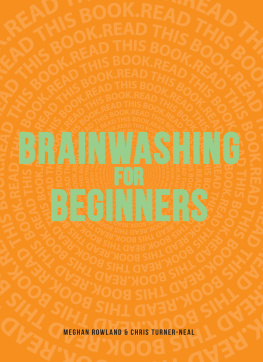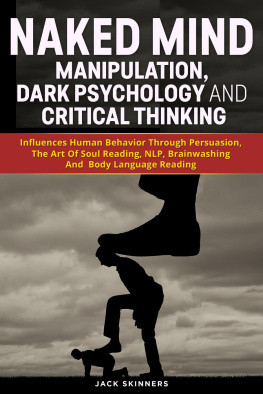
This is a Malor Books publication.
An imprint of ISHK
1702-L Meridian Ave #266
San Jose CA 95125-5586
1983, 2000 by Denise Winn
All Rights Reserved.
Including the right of reproduction in whole or in part in any form.
First published by Octagon Press, Ltd., 1983
The paperback edition published by Malor Books, 2000
This eBook published by Malor Books, 2021.
This edition ISBN 978-1-948013-06-2
Library of Congress Cataloging in Publication Data
Winn, Denise, 1950
The manipulated mind : brainwashing, conditioning, and indoctrination / Denise Winn.
p. cm.
Originally published: London : Octagon Press, cl983. Includes bibliographical references.
ISBN 1-883536-22-7 (pbk.)
1. Control (Psychology) 2. Social control. 3. Influence (Psychology)
4. Brainwashing. 5. Behavior modification. 6. Attitude change. I. Title.
BF632.5 .W56 2000 153.853--dc21
99-053289
Cover illustration, Landscape with Figures 1966 by George Tooker reproduced by courtesy of the artist.
Table of Contents
PREFACE
The Manipulated Mind was written in the very early 1980s. The world is a changed place since then, and yet the findings presented in this book appear to apply just as much today as they did when it was written. Of course, there would have been additions if the book had been written now. There would be more research findings from psychology to enforce the ideas expressed here about influencing feelings, behaviour and attitudes. Questioning of assumptions (see Chapter 3) is a large part of what cognitive behavioural therapy is all about a therapy which really blossomed in the 1990s and which challenges clients to look for evidence for unhelpful beliefs they hold about themselves. The current focus on fostering good parenting skills is a means of challenging old assumptions about childrearing.
Since the book was written, more cults have arisen and more have hit the headlines for disastrous reasons: Jonestown and Waco are two such disasters that leap to mind. More miscarriages of justice have come to light, because of which innocent people have spent years in prisons for crimes they never committed but felt compelled to confess to. The explosion in technology means computer game addicts willingly isolate them selves ever further from normal human contact, and the Inter net offers an accessible new medium for advertising and influence. There have been more wars and more crushing examples of mans inhumanity to man.
It all adds up to further evidence for the case made in this book that we are often less self directed than we like to think. I believe the original case still holds good, even approaching two decades later.
Denise Winn
May 1999
1 INTRODUCTION
The term brainwashing made its debut in print in an article published by the Miami News in September 1950. The author, Edward Hunter, coined the word as a rather downmarket translation of the Chinese hsi-nao, which meant to cleanse the mind, and used the article to claim that post-revolution China was using insidious never-before-known psychological techniques to force the Chinese into the Communist party.
He followed this up with other articles and books on the subject and, by the end of the Korean War, it seemed quite clear to the American public at least that American POWs who had collaborated with the enemy had had no choice. They were the innocent victims of a mind control exercise extraordinaire, a technique originally developed to persuade the Chinese of the correctness of the Communist line and then applied to enemy captives.
The brainwashing concept was let loose on a receptive audience. It was a shock, after all, to find that so many of the American boys captured in Korea wavered rather widely from the national line. The exact number of soldiers who, to some degree, went over to the other side, varied according to the sobriety of different source material. Authors, such as psychologist expert Joost Meerloo,...who are fearful of the effects of mass manipulation, cite that of 7190 US prisoners held in China, 70 per cent were swayed by Communist propaganda to make confessions or sign petitions calling for the end of the war though few remained Communist after the war and repatriation. Less dramatic versions of events cite one-third of American POWs taking up the Communist cause. Either way, the figure was high enough to shock Americans into embracing the brainwashing explanation and to numb them perhaps to the equally glaring fact that few British POWs and few, if any, Turks, who suffered the same treatments, capitulated.
The repatriated American POWs became, quite understandably, a phenomenon fit for study by numerous psychiatrists and psychologists, keen to unravel what, if anything, brainwashing was and, if it wasnt, what had led their boys to undergo dramatic reductions in their allegiance to President and country. It has been the role of much later investigators of events to posit the idea that the big brainwashing scare was fostered by the CIA.
Hunter, who introduced the term, was, after all, a CIA employee when he wrote on the subject. Not only was he a journalist but a propaganda specialist and had also served as a psychological warfare specialist in the Pentagon, according to Scheflin and Opton, authors of The Mind Manipulators, who investigated his biographical data. He set the scene in his first book for conveying the message that the United States was under attack by an enemy using secret mind control tactics and that only through equally covert counter-activities could this threat be removed. It is not, however, the subject of this book to look at the resultant activities of the CIA as they investigated the potential of hypnosis, programming, drugs, etc., to gain control of the mind. The several books which have been published on this theme seem to indicate that the CIA reaped embarrassment rather than enlightenment from its efforts.
It is relevant, however, to consider the origins of the word brainwashing because it is an interesting case of a word being coined to encapsulate a concept (for whatever reasons) and then, instead of the concept being the focus of study, the word itself becoming the target of interest. Many psychological experts and intrepid investigators have looked into the subject. Some have concentrated on proving that brains cannot be washed, end of matter. Others have concluded that brainwashing is a powerful, all-pervasive technique allowing first domination of the individual and then domination of the world. Joost Meerloo calls it political conditioning and claims:
Political conditioning should not be confused with training, persuasion, or even indoctrination. It is more than that. It is taming. It is taking possession of both the simplest and the most complicated nervous patterns of man .... The totalitarian wants first the required response from the nerve cells, then control of the individual and finally control of the masses. (From Mental Seduction and Menticide. )
And then there is the view, put by Scheflin and Opton, that brainwashing was, and is, an emotional scare word, serving only to prevent our having to face embarrassing or unpalatable truths. It was convenient, for example, to claim that Patty Hearst was brainwashed into taking on the aims of the revolutionary group that kidnapped her in 1974 rather than face the possible fact that even symbols of the success of the American way of life could undergo radical change.
What might now in the eighties seem an academic argument has instead become of new relevant interest, in the light of the recent proliferation of religious cults whose members, many claim, are brainwashed into joining. In March 1981 an English High Court jury decided that the Moonie cult does brainwash people (the word was used), after hearing an action brought by the cult against the Daily Mail newspaper which had printed allegations about the church that breaks up families.
Next page










